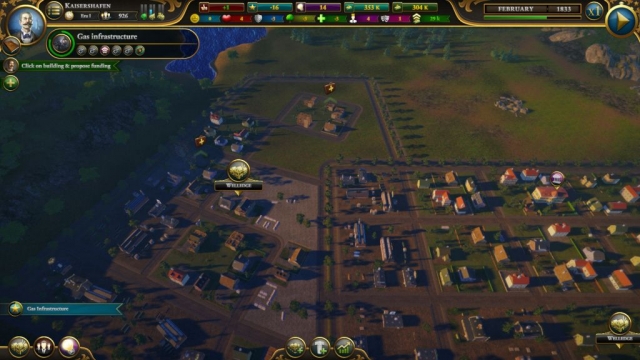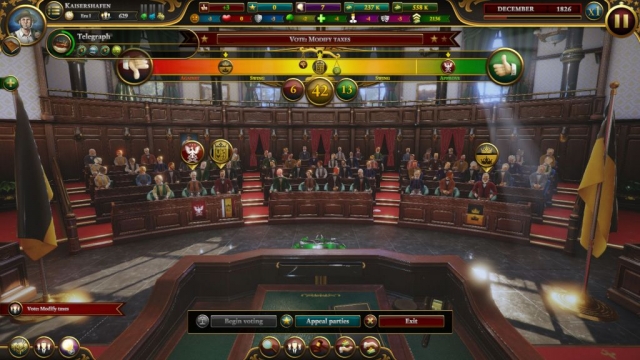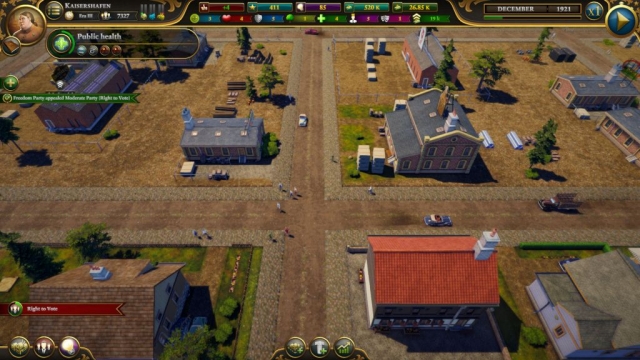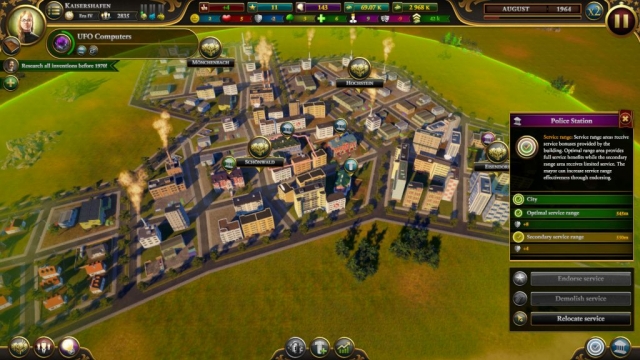Urban Empire
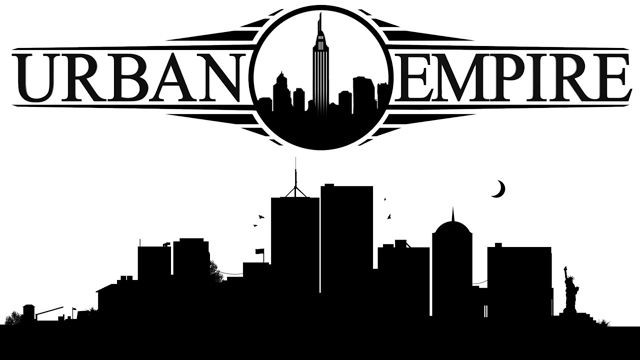
Urban Empire is a city simulator from Finnish developer Reborn Games. In it, you control a fledgling city from 1820 to modern times, zoning new districts, building up the infrastructure, issuing edicts, researching advances, and more. It sort of looks like Tropico in a regular city, but it’s not. As mayor of the city, you don’t have direct control over everything. You can only influence what happens, so the game gives a different sort of experience.
When you start a new game of Urban Empire, you first have to pick your family. There are four choices for this: a family of aristocrats, a family of inventors, a family of blue collar workers, and a family of artists. The family you pick gives you some starting positives and negatives, but it doesn’t prevent you from playing in any particular way. You’re not allowed to create your own family. You’re not even allowed to pick your name.
Then you select where you want your city to be. Surprisingly, there are only three options for this: one friendly flat plain (which is good for your first city) and two more irregularly-shaped mountainous regions (which are better for when you know what you’re doing). But once again you’re not allowed to personalize anything. Your city is always named Kaisershafen in the country of Swarelia.
Once you have control of your city, you have to start creating districts. Districts have a minimum and maximum size, but they can be any shape, so you can fit them together however you want. You can also — amazingly — pick their names. (The game will make suggestions for this, but it likes to pick the same name over and over again, so you’re better off choosing your own.) You can only control two things about districts: the percentage of space for residential, commercial and industrial buildings, and the density, which determines how big / tall the buildings can be. The game creates the roadways for you, and people in your city construct most of the buildings.
However, there are a few things that you can build. Institutions (like train stations, hospitals, and radio towers) give bonuses to your entire city; municipal services (like schools, police stations, and theaters) give bonuses to nearby residents; and infrastructure elements (like sewer lines, waste bins, and traffic lights) give bonuses to an entire district. You’re only allowed to build one type of each institution, but for the others you can build as many as you want — provided you can afford them. All of the things you construct have significant upkeep costs, so you can’t build willy-nilly. You have to get your economy going first and then build what you can.
The only way to make money in the game is through taxes, but you’re not allowed to charge whatever you want. You can only recommend changes and then have the city council vote on them. (The council votes on everything that affects money in the city, which means you have to visit them a lot.) But for the most part, if you’re losing money then you can raise taxes, and if you’re making money then you can’t. Unfortunately, it’s easy to create a temporary deficit, so it’s easy to crank up taxes, and the council only rarely decides to lower them. So once you figure out this trick, gaining money becomes much easier.
Along with voting on taxes, the city council also votes on laws, edicts, and elections. The game spans five eras, and while you’re guaranteed to stay mayor for the first two eras, you have to start dealing with elections for the latter three, which means you have to start playing nice with the city’s political parties. When you do something a party likes, you gain goodwill with them, which makes it more likely that they’ll vote your way. You can also use goodwill to ask for favors or threaten them.
Unfortunately, the game also includes prestige. If you keep your people happy (by meeting their needs for security, health, entertainment, and more) then you earn prestige, which you can use to overrule decisions made by the city council — including elections. Each vote you change costs prestige, but as long as you use your goodwill to keep things close, you never have to worry about being voted out of office.
You also control the city’s research, including such topics as refrigeration, computers, and of course viagra (depending on the era you’re in). Your research rate is controlled by the “brain power” of the city, which you can increase by adding schools, libraries, and a university. Each research topic can unlock new buildings, new edicts, and new tools for you to use, so the more you research, the more options you have, which is always nice.
Finally, along with everything else, you also have to handle events. Events include political parties doing things (like insulting you or asking for favors), things happening in the city (like people protesting or the circus coming to town), and deciding how to use new inventions (like how best to employ typewriters or how to get involved in the space race, if at all). That is, events force you to make decisions, and they impact your character and the city.
Everything I’ve described above could work for a game, but it doesn’t in this case, at least not very well. Urban Empire has two main problems. The first is that there just isn’t enough for you to do. You can’t build many things, so you spend most of your time waiting for money or dealing with the city council. The former is boring, and the latter is less than satisfying because of how simplistic and unrealistic the political parties are. In some city builders, you can also have fun just watching your city evolve and go through its daily routine, but I didn’t find that to be the case with Urban Empire. Events also repeat with regularity, which starts to make the game feel like a repetitive slog.
The other problem with Urban Empire is that it’s poorly constructed, and it isn’t explained very well. The tutorial is a mess. A lot of game mechanics are hidden, confusing, or misleading (like when you see that a business just received a -5% demand for its products, and you eventually learn that that’s a good thing). Icons are used all over the place to make localization easier, but the tooltips for half them are missing, so you have no idea what’s going on. The text size in certain windows is microscopically small, so you can’t see the details about certain buildings and services. And the game slows down significantly as your city grows.
Urban Empire even gets some basic stuff wrong. For example, from what I can tell there isn’t really any crime in the city. Police stations just give your residents a security bonus and that’s it, so you don’t need to have police stations (or fire stations) if you can get enough security from other sources. Or consider this. In the first game I played, I never hooked up any of the districts to the electrical grid, but it didn’t matter. Every building had electricity anyway. All the electrical grid does is give a small bonus to businesses.
Overall, Urban Empire is a game that gets just about everything wrong. Your city isn’t a lot of fun to build or watch, and there isn’t a lot for you to do. The replayability is also poor, since there is very little difference between playing two different cities. Urban Empire just needs more things included, they need to work better, and they need to be explained better. Maybe that will happen with future patches, but I sort of doubt it, so Urban Empire is definitely a game to skip.
Reviewed By: Steven Carter
Publisher: Kalypso Media
Rating: 59%
——————————————————————————–
This review is based on a digital copy of Urban Empire for the PC provided by Kalypso Media.
 Game Over Online
Game Over Online